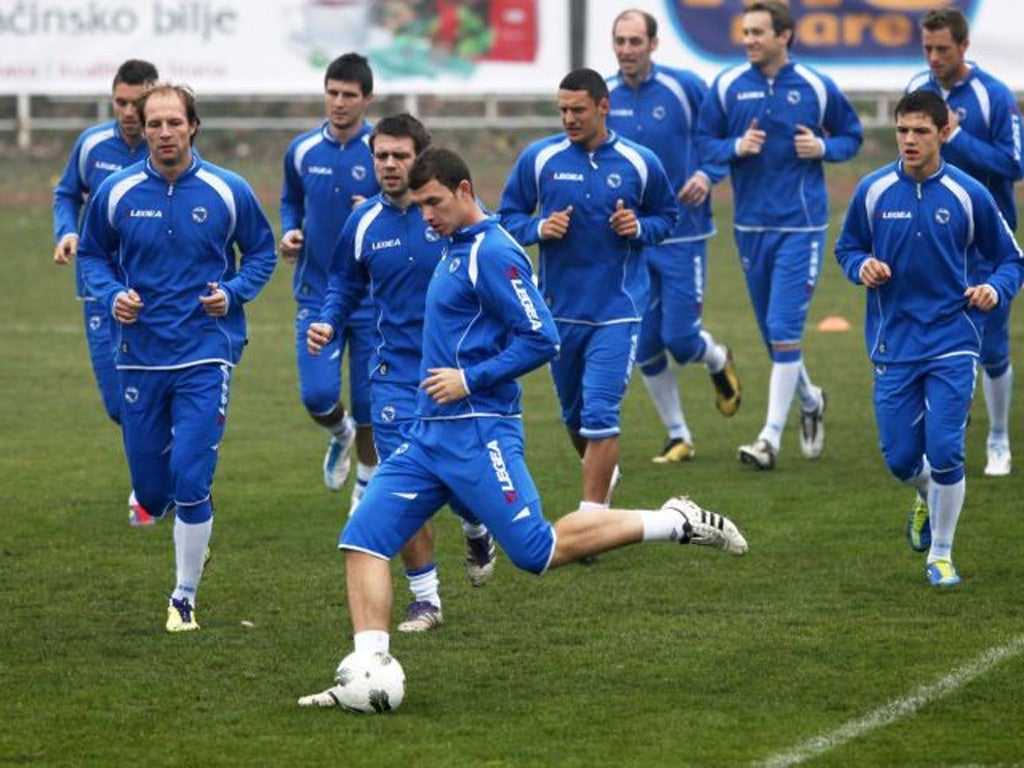Bosnia-Herzegovinia: Young republic united by football

Your support helps us to tell the story
From reproductive rights to climate change to Big Tech, The Independent is on the ground when the story is developing. Whether it's investigating the financials of Elon Musk's pro-Trump PAC or producing our latest documentary, 'The A Word', which shines a light on the American women fighting for reproductive rights, we know how important it is to parse out the facts from the messaging.
At such a critical moment in US history, we need reporters on the ground. Your donation allows us to keep sending journalists to speak to both sides of the story.
The Independent is trusted by Americans across the entire political spectrum. And unlike many other quality news outlets, we choose not to lock Americans out of our reporting and analysis with paywalls. We believe quality journalism should be available to everyone, paid for by those who can afford it.
Your support makes all the difference.At Remembrance weekend it is perhaps worth recalling the capacity of football to unite can be exaggerated.
The soldiers who famously played football in no-man's land at Christmas 1914 were soon shooting at each other again. More recently the togetherness engendered by the black-blanc-beur French World Cup winners of 1998 has since disintegrated amid riots in the banlieues, pitch invasions when France played Algeria, and this year racism row which embroiled coach Laurent Blanc.
Nevertheless, Bosnia-Herzegovinia's appearance in tonight's European Championship play-offs is seen as a significant step towards uniting the young republic after the Balkan Wars of the late 20th century. The team features players from all three major ethnic groupings, Bozniak (such as Manchester City's Edin Dzeko), Serb (Dynamo Moscow's Zvjezdan Misimovic) and Croat (Rangers' Sasa Papac). This ethnic mix has long historical roots, dating back to the arrival in a previously Slavic Christian area of the Muslim Ottoman Empire in the 15th century. The three groups largely lived in 'relative' peace, under various rulers, until the break-up of Yugoslavia two decades ago. Bosnia-Herzegovinia declared independence but was rapidly drawn into the war between the Serb-dominated rump of Yugoslavia and Croatia. Appalling atrocities were committed, with neighbour set against neighbour, before peace was achieved in 1995.
As part of that agreement the government has a tripartite presidency of the ethnic groups, a formula copied by the Football Association until Fifa suspended it from international competition last year to force through a single presidency. Ivica Osim, who was Yugoslavia's last coach before resigning in 1992 because his family in Sarajevo was under bombardment, heads the normalisation committee.
The history is relevant because it is the baggage the team carries. Few players were untouched by the war. Dzeko was six when war broke out. He has recalled: "They were hard years. There wasn't much to eat. I was afraid. We always had to hide when shots were fired and bombs were falling. My house was destroyed so we went to live with my grandparents. The whole family, maybe 15 people, staying in an apartment of about 35 square metres.” Asmir Begovic, the Stoke goalkeeper, became a refugee at four, fleeing with his family to Germany, then Canada. “It would mean everything for the country [if we qualify],” he said this week. “It is such a small country it would be a tremendous achievement, but we have good players I think we can do something.”
The problem for coach Safet Susic, who appears to have maintained the ethnic unity predecessor Miroslav Blazevic forged, is that several of those players, notably a trio of defenders, are unavailable including the suspended Papac. We have problems," he admitted.
Bosnia are staging the fixture in Zenica, the 'Steel City' in whose tight, intimidating 15,000-seat stadium they rarely lose. They did, however, lose 1-0 there to tonight's opponents in the World Cup play-off two years ago, going down 2-0 on aggregate. "I am glad that we play the first game at home," said Dzeko, upon whose shoulders Bosnia's chances probably rest.
Join our commenting forum
Join thought-provoking conversations, follow other Independent readers and see their replies
Comments